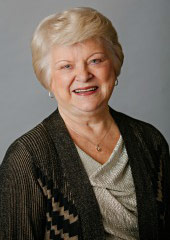
Peace In The Eye Of The Storm: Ministering to Those Who Grieve
Written by Dr. Jan Bentley PsyD, LMSW
Our Good-byes Are Not Forever
It can be very hard to find peace in the eye of the storm. Someone has said that when we lose a parent, we lose the past. When we lose a spouse, we lose the present and when we lose a child, we lose the future. That is exactly how I felt as I sat at my kitchen table in the early morning hour of June 22, 1994 and heard the police officer say that our precious daughter, Cheri, our only child, had been involved in a car accident, just six miles from our house, and was killed instantly.
At that moment, my dreams and hopes were shattered and, in the days, and months that followed I experienced the deep pain of living IN THE EYE OF THE STORM.
The journey of grief is not an easy road. Often, I prayed desperately that God would “hang onto me” and help me be obedient to His plan for my life. My prayer was that this experience would not be wasted, that somehow God would use it for His glory.
My courage to go on came/comes only from knowing the character of God and knowing that I can TRUST HIM.
As I look back, through the wisdom of years, I now see, through a rainbow of tears, that I was not in the eye of the storm. Rather, I WAS IN THE EYE OF A MIRACLE. God’s faithfulness kept me safe as He carried me through my deepest pain. I found peace in the eye of the storm.
Characteristics of Grief and Loss
The grief response is multifaceted and includes all aspects of one’s being, the behavioral, cognitive, emotional, physical, and spiritual simultaneously. This holistic experience of grief often causes the sensation of “going crazy”. Contrary to public opinion, there is no right or wrong way to experience grief. Each person has their own timetable and style of grief. However, the following are common symptoms recognizable in most grieving people:
Behavioral Symptoms
- Sleep disturbances
- Appetite disturbances
- Social Withdrawal
- Crying/intense at times
- Restlessness/Over activity
- Dreams of the deceased
- Desire and need to talk about the deceased
Cognitive Symptoms
- Confusion/difficulty concentrating and making decisions
- Preoccupation with thoughts of the deceased
- Senses presence of the deceased
Emotional Symptoms
- Anger – may be directed at oneself, others, the deceased, and yes, even God
- Anxiety – about losing another loved one and about the future
- Depression/Sadness – thoughts of despair and hopelessness. Not wanting to go on without the deceased.
- Fear – that self and others will forget the deceased
- Guilt – may be obsessed with the “what ifs” and “if onlys”
- Helplessness – feeling unable to cope or get better and that no one understands
Physical Symptoms
- Fatigue/lack of energy
- Aching/weakness of muscles
- Hollowness in the stomach
- Tightness in chest/throat
Spiritual Symptoms
- Reassessment of one’s faith and belief system
- Faith that once brought comfort may feel empty
- Feeling disappointed with God
- Feeling betrayed by God
- Conflict between experiencing the “peace that passeth all understanding” and questioning God, His wisdom and faithfulness

“. . . weep with them that weep”
Be sensitive to those who grieve; following are some do’s and don’ts:
DO:
- Make contact as soon as possible either in person or by phone
- Go to the funeral home if it is possible and do sign the register
- Extend your sympathy – presence and physical touch/hugs are important – no words are necessary
- Send a sympathy card, plant, or memorial
- Bring in meals
- Give a listening ear, most people in grief have a strong need to talk
- Share memories of the deceased
- Send notes and cards of encouragement
- Remember the family in prayer long after the funeral. Often the second year of grieving is more difficult that the first.
- Remember that grieving is a process, takes time, and is a healthy response to significant loss
- Offer to pray with the grieving person
- Remind them that God grieves with us
DON’T:
- Please do not ask for details about the death, the family will share if they so desire.
- Please do not use clichés such as “time will heal”, “God never makes mistakes”, or “Romans 8:28”.
- Please do not avoid talking about the loved one.
- Please do not say “you understand, or you know how I feel”, unless you have lost a loved one.
- Please do not say “at least you had her for 24 years”. What year would you choose for your loved one to die?
- Please do not say to “shape up” after three months of grieving. The normal grieving process takes two to five years. (Grieving is the price we pay for loving. Encourage them to grieve well.)
- Please do not question if I am over it yet. I will never be “over it”.
- Please do not be my Holy Spirit, just let me talk if I want to and cry when I must.
- Please do not judge my spirituality but try to see as God sees, try to love as God loves.
“For I know the plans I have for you says the Lord. They are plans for good and not for evil, to give you a future and a hope.” Jeremiah 29:11

Dr. Bentley’s goal is to provide an environment in which each person is treated with respect, understanding and genuine concern. She strives to help clients integrate personal health with developmental and spiritual maturity. Her counseling, whether with individuals or couples, strives to be consistent with Biblical principles and accepted professional practice. Learn more here.
